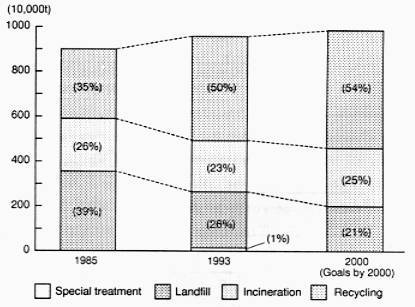Chapter II -4 :Quality of the Environment in Japan 1997
Chapter II : How to Utilise Products with Consideration for the Environment
4. Change of Production/Consumption Activities for a Sustainable Future
In order to secure the "material cycle" within an economic/social system, and to build a sustainable society, it is necessary to comprehensively reduce the environmental pressures that occur at each phase of the production process, from the initial extraction of raw materials to the final disposal of the product when it has become waste. For this, it is important the enough environmental care is taken at both the production and the consumption stages, both of which take a large share in economic activities.
In the main, decision making regarding manufactured products is made by the business community. Therefore, it is necessary to try to reduce environmental pressure at the manufacturing stage, taking into account the pressures produced in all phases of manufacture, consumption and disposal. It is also very important that consumers actively choose products that carry with them a low environmental load.
To establish a circular economic/social system, goals of waste/recycling measures need to be established. The Danish Government set a goal to increase the recycling rate from 50% in 1993 to 54% by the year 2000, and to reduce the amount of landfill from 26% to 21%.
Germany established the "Circular Economy Waste Control Law" in October 1996. This law aims to realise economic activities based on a circular production-disposal system with a minimum amount of waste generation. This effort will probably be a good model for efforts in Japan.
Waste Disposal Goals in Denmark

- Note:
- The percentages are set against the total waste amount.
- Source:
- Compiled by the Environment Agency from document issued by the Danish Environmental Protection Agency